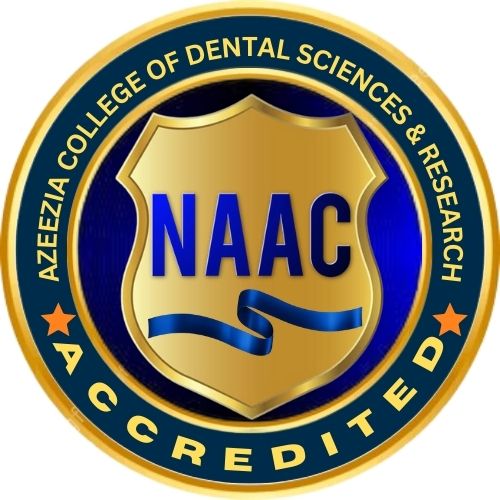Pallident– The role of a dentist in Palliative care
Objective:
A collective initiative in collaboration with Pain and palliative care trust, Kollam, National service Scheme, Azeezia DentalCollege, teaching and non-teaching faculties and students of Azeezia DentalCollege, aims at improving the quality of life of needy patients and their families facing issues related to life threatening illness by employing active total care. It provides relief from pain and other distressing symptoms by integrating the social, psychological aspects of patient care. Palliative Care posting and home care visits started during the academic year 2023 and aims at inculcating a caring mentality among the students and the activities of the same are continued with vigour and vitality by the college staff in cooperation with the students, so that we could render patients and their loved ones expert clinical and moral support.
The Context:
Palliative care programme in our college initiatives give students an open platform to meet the suffering ones, know about their hardships and they will learn to be passionate to such peoples. Activities are planned along with pain and Palliative care trust Kollam. The patients over there are mainly from poor socio economic status and there is a vast civic who needs support, care and guidance. The main reason for choosing this area as our project is because these people are basically marginalized Community. Lack of awareness, ignorance of medical facilities, lack of knowledge about various govt schemes, unhygienic living conditions, poor financial background are the major setbacks that these people experience. Because of these hindrances, lots of palliative cases are there in this community.
The Practice and evidence of success:
The programme is carried out mainly under these areas- Home care visits, 10 rupee challenge, Remedy, and Dress for a cause.
Home care visits- During the time of visit they interact with patients and their family members, collect the details of needed things such as medicines, food items, surgical items or any other help they need.
10 rupee challenge- By donating just 10 rupees a month by all teaching and non teaching staff and students would help the palliative care patients improve their quality of life. It’s as simple as skipping a tea a month to help someone ease their pain.
Remedy- A medicine drop off box was installed to drop off used but not expired left over medicines with clear intact labelling. All medicines collected are handed over to the patients of palliative care under the supervision of registered medical practitioners.
Dress for a cause-A clothing drive is organised regularly to donate used or new clothing for these patients.
Distribution of food kits – In most of the visits the patients often request for groceries. Grocery items in the form of kits are distributed to palliative patients accordingly.
Problems encountered and resources required:
Student palliative programme gives younger minds a chance to understand the real life of people that is entirely different from the colours of campus. It helps to nature human values such as love, sharing, and kindness in the minds of students. However the major difficulty was to reach homes that are far away from the campus without affecting the regular functioning of the college. Collaborations with various NGOs, clubs and associations are underway to enhance the quality and quantity of the palliative care activities.
Title of the Practice:
Fish farming
Objectives
More and more people have been embracing the idea of farming lately, concerned with health and environment care issues. Benefits of farming also include another significant aspect – the higher nutritional value of natural food as compared to the one grown with chemical additives.
Hence the basic idea of fish farming in Azeezia dental college is to provide food with optimum nutritional value and minimum dangerous ingredients, with only permitted substances used.
The contex
Fish farming in colleges creates awareness on harmful effects of chemical-based food to health and refreshes the importance of saving environment and adoption of eco-friendly practices.
It also enhances student’s food literacy by familiarizing them with foods grown, teaching them how and where their food is grown, building knowledge about how to prepare healthy food and educating them about health, nutrition, social and environmental impacts of food choices.
The practice
Colleges are recognized as institutions that impart knowledge and give quality education, and thereby build a nation’s future. Fish farming in colleges can shape the future of the country and even that of the whole world. Apart from helping students understand the process of cultivation and recognize what makes food nutritious, the practice of fish farming creates a wider, healthier ecosystem in the campus. The student’s participation in farming sensitized and improved the skill of students while implementing the project. The programme roused the interest of the student’s in learning the correlation farming with production of healthy food. It also acts as a catalyst for learning life skills.
Problem encountered and resources required:
Less production: The initial yield in fish farming is less in the initial years. So, it’s difficult to accommodate large-scale production.


